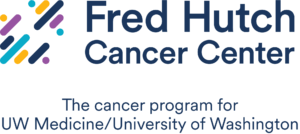February 11, 2025:
The Big Ten Cancer Research Consortium (Big Ten CRC), a collaboration of the cancer centers of Big Ten Conference universities united to transform cancer research by leveraging their scientific and clinical expertise, welcomed new member Fred Hutch Cancer Center, an independent, nonprofit organization that serves as the cancer program for UW Medicine (the University of Washington’s health system). It is the first new institution to join the consortium following the recent expansion of the Big Ten Conference.

Through membership in the consortium, cancer researchers from Fred Hutch and UW Medicine may participate in the Big Ten CRC’s Clinical Trial Working Groups, submit research concepts for consideration as Big Ten CRC studies, and collaborate with investigators across Big Ten cancer centers on clinical trials, observational studies, and other initiatives of the consortium.
“Making new strides in preventing, detecting and treating cancer takes large teams, and collaborating with other leading research organizations is one of the best ways to accelerate our impact. Joining the Big Ten Cancer Research Consortium expands the opportunities to make new breakthroughs,” said Bruce Clurman, executive vice president, chief scientific officer and deputy director, and holder of the Rosput Reynolds Endowed Chair at Fred Hutch Cancer Center.
Collectively, Fred Hutch and UW Medicine bring significant cancer research strengths to the consortium, with many Fred Hutch researchers serving on the faculty in the UW School of Medicine.
Fred Hutch has been home to three Nobel laureates in its 50-year history. Known globally for its development of bone marrow transplantation, it is widely recognized for a track record of discoveries spanning cancer, infectious disease and basic research. These include important advances in immunotherapies, HIV/AIDS prevention and COVID-19 vaccines. Based in Seattle, Fred Hutch is the only National Cancer Institute-designated cancer center in the state of Washington.
As one of the nation’s top federally funded research institutions, UW Medicine is an international leader in translating scientific findings into improved clinical care for cancer patients. Through its collaborative, interdisciplinary research approach, it has contributed to advances in prevention, screening and detection, diagnosis, and treatment of a wide range of cancers. Cancer surgery, medical oncology, immunotherapies, radiation oncology and psychological aspects of care are among the cancer patient care areas that have benefited from UW Medicine research.
“The addition of the Fred Hutch Cancer Center to the Big Ten Cancer Research Consortium is a win-win for patients and physicians in the Northwest, allowing for cutting-edge collaborations with a large network of cancer hospitals nationwide,” said Dr. John K. Amory, professor of medicine and associate dean of translational medicine in the Office of Research and Graduate Education at the University of Washington School of Medicine. “UW Medicine is proud to partner with Fred Hutch in this endeavor which draws on the deep history and strength of both organizations in innovative research and high-quality patient care.”
Investigators at Big Ten CRC member institutions have access to a wide range of benefits and resources through the consortium, such as:
- Clinical Trial Working Groups: Researchers from Big Ten CRC member institutions meet every 6-8 weeks in Clinical Trial Working Groups to develop and launch collaborative studies. These groups span 14 disease-specific areas, in addition to groups focused on adolescent and young adult (AYA) cancers, comparative oncology, and correlative sciences.
- Mentorship: The Big Ten CRC supports mentorship opportunities for early-career faculty and fellows who work alongside experienced colleagues both internally as well as across academic institutions.
- Non-Clinical Research: Recognizing that the continuum of cancer care involves more than just treatment, Big Ten cancer researchers actively collaborate on population-based studies and nontherapeutic research areas such as cancer prevention, survivorship, and quality of life. In addition, global oncology experts meet regularly to discuss institutional priorities and opportunities that cross borders.
- Diversity Resources: The Big Ten CRC is dedicated to increasing diversity, equity, and inclusion within clinical trials. The Diversity Committee focuses on educating, advocating, and engaging the Big Ten CRC community to create partnerships and use resources in conducting clinical trials to ensure equitable access for underrepresented populations.
About the Big Ten Cancer Research Consortium: The Big Ten Cancer Research Consortium was created in 2013 to transform the conduct of cancer research through collaborative clinical trials and observational studies that seek to improve the lives of cancer patients in the diverse communities we serve by leveraging the scientific and clinical expertise of Big Ten universities. The Big Ten Cancer Research Consortium creates a unique team research culture to drive science rapidly from ideas to treatment and prevention. Within this innovative environment, today’s research leaders collaborate with and mentor the research leaders of tomorrow. Since its founding, the Big Ten CRC has activated nearly 40 clinical trials across a wide range of cancer types, more than 1,000 participants have enrolled in Big Ten CRC studies, and more than 500 researchers have joined Big Ten CRC Clinical Trial Working Groups.
About the Big Ten Conference: The Big Ten Conference is an association of world-class universities whose member institutions share a common mission of research, graduate, professional and undergraduate teaching and public service. Founded in 1896, the Big Ten has sustained a comprehensive set of shared practices and policies that enforce the priority of academics in the lives of students competing in intercollegiate athletics and emphasize the values of integrity, fairness and competitiveness. The broad-based programs of the 18 Big Ten institutions provide direct financial support for more than 11,000 participation opportunities on 350 teams in 42 different sports. The Big Ten sponsors 28 official conference sports, 14 for men and 14 for women. For more information, visit www.bigten.org.














Subscribe to the Big Ten CRC Newsletter X
X Facebook
Facebook YouTube
YouTube